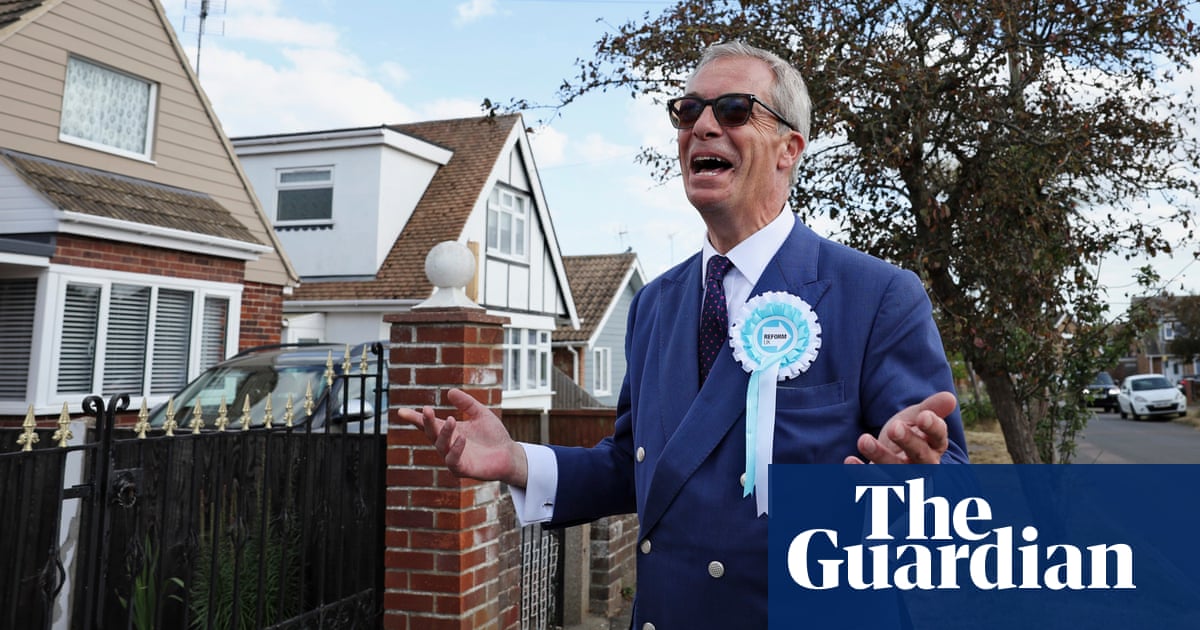
Nigel Farage has hailed Reform UK’s “almost unbelievable” early performances in former leave-voting seats, predicting the party will win “many many seats right across the country” as the election unfolds.
The hard-right party was projected to win as many as 13 seats in the general election, according to the 10pm exit poll. Declarations in north-east England showed them outpolling the Conservatives to come second to Labour.
The projection also indicated that Farage, who sparked a political earthquake on the right after he returned as leader of the party last month, was set to win the Essex seat of Clacton.
Farage used a video posted on X to deliver his first response to the exit poll, saying: “It’s midnight, there are two results in from the north-east of England that put Reform on 30% of the vote, that is way more than any possible prediction or projection. It is almost unbelievable.
“And what does it mean? It means we’re going to win seats, many many seats I think right now across the country. But to watch the TV coverage it’s almost comical.
“There’s not a single representative on there from Reform UK, mainstream media are in denial just as much as our political parties. This is going to be six million votes-plus. This, folks, is huge.”
While there was caution about how the poll of 20,000 would ultimately translate into seats, it was clear that millions of people had voted for the hard-right, anti-immigration party, which has previously indicated its intent to destroy the Conservative party.
Ben Habib, Reform’s deputy leader, was the first of the party’s senior figures to seize on the BBC/ITV/Sky survey projection. He tweeted: “This is a huge bridgehead. This is politically seismic. This is the beginning of the fightback for the nation state of the United Kingdom.”
Early declarations underlined the surge in support for the party in what had been strong Brexit-supporting areas of north-east England, where Reform outpolled the Tories in a number of seats.
Blyth and Ashington, a new seat in the Brexit-supporting north-east of England, was won by Labour’s Ian Lavery with 50% of the vote but there was a shock as Reform came second with 27%. Its candidate, Mark Peart, polled 10,857 votes, more than 4,700 ahead of the Conservatives.
Reform polled 10,779 in Sunderland Central – 6,073 votes behind the newly elected Labour MP Lewis Atkinson – and pushing the Tories into third place with almost twice as many votes as them.
While Farage has always kept his cards close to his chest about how many seats he expected to win, the projected seat share is believed to be much higher than what he could have hoped for.
Farage’s agent, Peter Harris, told the Guardian that it was early days but the party appeared to be in a strong position. “We could see that there was a strong turnout. In places like Jaywick, the queues were long, and had people in there who had not voted before or had given up on voting until now,” he said.
The expected vote share opened up the possibility of the electorate returning Reform MPs in target seats from Essex, the Kent Coast, south Wales and Yorkshire and the Humber.
Richard Tice, Reform’s chair and the man who stepped aside so that Farage could return, appeared to be in a strong position to win in the Lincolnshire constituency of Boston and Skegness, which has been represented by Tory Matt Warman since 2015.
Others who were in a strong position included the former Southampton Football Club chair, Rupert Lowe, who was running in Great Yarmouth, which has been held by the Conservatives since 2010.
In places such as Barnsley north, a Reform target seat, voters were on course to elect a candidate who had been dropped during the campaign. Robert Lomas was among a number of Reform candidates disowned by the party last month as it was engulfed by a row over racist and offensive comments by some of its members.
In the main, Reform’s progress came at the expense of the Conservatives. However, the close contest in Barnsley North reflected the extent to which the radical right party could emerge as a political threat to Labour. Dan Jarvis, the shadow security minster, was the Labour candidate in Barnsley North, a new constituency.
Stephanie Peacock, who has been a Labour MP since 2017, also appeared to be under threat from Reform in Barnsley South.
However, a note of caution was sounded by Prof Sir John Curtice, the psephologist and lead election analyst for the BBC, who said that the projected seat shares for Reform UK and the SNP were the two figures about which he and others were least certain.
Source: theguardian.com


















